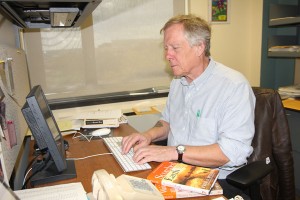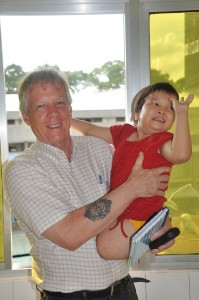Though Fred Wilcox, associate professor of writing, was too old to be drafted into the Vietnam War and didn’t set foot on Vietnamese soil until long after the dueling nations ceased fire, memories of the war’s victims drive his career.

Wilcox’s newest book, “Scorched Earth: Legacies of Chemical Warfare in Vietnam,” is the first to completely chronicle the effects of the United States’ use of chemical weaponry on the Vietnamese people. With an introduction by anti-war activist Noam Chomsky, “Scorched Earth” comes 50 years after the U.S. began using Agent Orange, a powerful herbicide manufactured for the Department of Defense. Now, more than three million people face chronic illnesses traced to the chemical.
Published in September by Seven Stories Press, the publication coincides with the re-release of Wilcox’s 1983 book on the subject, “Waiting For An Army to Die: The Tragedy of Agent Orange,” the first book to reveal the effects of the chemical.
Wilcox’s inspiration to fight against the injustices of international combat came during a visit to a military hospital in 1967.
While living on the streets of New York City, Wilcox learned his cousin was expected to die in St. Albans, a hospital for soldiers wounded during war. He said walking through the ward to meet his cousin was like walking into a Walt Whitman creation. Soldiers were tied to beds with ropes and cloth and screamed in agony. After listening to the stories of the mentally ill veterans in the ward and being asked not to join the war effort by his cousin, a soldier of 19 years, Wilcox became an anti-war activist.
“At that point, I made up my mind and decided that as long as I lived I was never going to stop talking about the Vietnam War,” he said. “I was never going to stop trying to get the United States to admit what it did. This book is the outcome of that vow that I made.”
Wilcox said he wrote the book to raise awareness about the effects of Agent Orange on soldiers from both sides of the conflict and to show the damage war has on the environment and public health. The real solution, he said, is to understand the lasting implications of releasing biological weapons into the air.
“Look at Vietnam and look at the pictures in my book, because by not looking at these people you’re in denial about your country and the peril you face,” he said.
For his first book, Wilcox traveled around the U.S. to speak with doctors and veterans to gather research. To complete “Scorched Earth,” which focuses on the Vietnamese people rather than mostly American veterans, he spent time in Vietnamese towns and children’s hospitals.
His son Brendan Wilcox, a professional photographer and writer, joined him in Vietnam to take the pictures featured in the novel.
Brendan said he wanted to be a part of the project, but seeing the deformed and sickly children in Vietnamese hospitals often made him physically ill, and he sometimes missed interviews because he had trouble dealing with the suffering.
“One of the hardest things for me was a photograph of this kid who looks like a skeleton,” he said. “He’s laying on his bed and he was the same age as me. All I could think was this kid could never leave the house. He’ll never have a girlfriend, he’ll never have kids, he’ll never do anything.”
He said he continued working on the project because he believed in the cause and thought it could help people understand the lasting effects of war.
“We have this view that we’re these great liberators, that we go to places and we liberate them and we’re done,” he said. “But it’s much more than that.”

Jeff Cohen, associate professor of journalism and director of the Park Center for Independent Media, was asked to review “Scorched Earth” for Seven Stories Press. He said the book is a crucial addition to the discussion of Agent Orange.
“People should react by saying to the government in Washington, ‘What are we doing to make up for what we did to the Vietnamese?’” he said.
Seven Stories Press is known for its literature on human rights and social and economic justice. Assistant Editor Gabriel Espinal worked with Wilcox to complete the novel. Espinal said this book can help bring more attention to the issue.
“Before I read ‘Scorched Earth’ I had images of sick people, but I didn’t have a very concrete idea of what that sickness entailed or that it was ongoing,” he said.
Wilcox said this book isn’t the end of his research on the effects of chemical warfare because of people like his friend William Crapsur, a veteran who was crippled by exposure to Agent Orange.
“I’ve met these people who refuse to give up,” he said. “They inspired me to keep going.”




